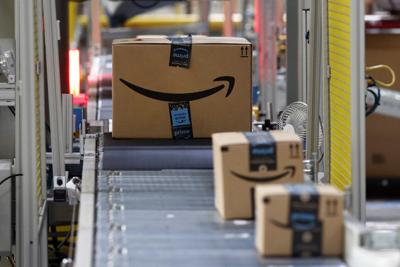The Wisconsin Supreme Court let a lower court ruling stand that a group of Amazon workers in the so-called “gig economy” in the state should be classified as employees in a case that was being watched closely for its impact on businesses statewide.
The ongoing legal battle between Gov. Tony Evers’ administration and Amazon focuses on whether delivery drivers in the tech giant’s Logistics division are considered Amazon employees or independent contractors.
This is a version of a debate occurring nationally, with the ultimate outcome shaping everything from taxes to whether workers can unionize.
In Wisconsin, observers believed the Amazon case could shape how the state Department of Workforce Development approaches other services, like Uber, Instacart or DoorDash, that have become ubiquitous in Wisconsin.
A lower court ruling found, using a complicated test, that the drivers do in fact work for Amazon, saddling the company with a tax bill of more than $200,000.
The Wisconsin Supreme Court declined to undo that ruling, instead issuing a unanimous ruling that it should not have taken up the case in the first place, deeming it to have been "improvidently granted.”
In a written opinion, Justice Ann Walsh Bradley said that, after reviewing the facts of the case, the court found that “the issues for which we took this fact-dependent case will not lead to any further development of the law.”
The Amazon case centered on a program the company operates called Amazon Flex, where a person can use their own smartphone and vehicle to effectively operate as a delivery driver, signing up for blocks of package deliveries and then distributing them while using a mobile application to track their progress.
Amazon Flex operates in the Milwaukee area. Between 2016 and 2018, DWD audited the status of over 1,000 delivery drivers who the company had deemed to be independent contractors.
“The Amazon Flex program gives individuals the opportunity to set their own schedule and be their own boss, while earning competitive pay. We hear from most of the Amazon Flex delivery partners that they love the flexibility of the program, and we’re proud of the work they do on behalf of customers every day," Steve Kelly, an Amazon spokesperson, said. "We’re disappointed that the Wisconsin Supreme Court declined to weigh in and provide much needed guidance on these matters and are determining our next steps.”
Under state law, the process for proving whether someone is an independent contractor is messy. First, a company must prove that the worker’s services are not controlled or directed by their employer.
If that condition is met, then a nine-question test is applied, with factors including whether a person is using their own property to carry out a job, if they're fully reliant on one employer for their livelihood and if they have contracts with multiple different employers.
Six of the nine criteria must be met to classify someone as an independent contractor. In the case of Amazon, DWD and the Labor and Industry Review Commission found only one of those conditions was satisfied, ultimately ruling the company must pay over $205,000 in back taxes from 2016 to 2018.
The company appealed in court and a Waukesha County judge sided with Amazon before the matter went before the state Court of Appeals. There, the three-justice panel found that five of the nine criteria were met, narrowly deeming Amazon’s drivers to be employees.
It is difficult to tell whether this ruling will transfer to other "gig economy" companies, said Samantha Prince, assistant professor of law at Penn State Dickinson Law. That's because Wisconsin law so heavily relies on the facts of a specific case.
But there is little doubt, she said, that observers were tracking the case as "just one of many dominoes that are starting to fall."
"It will likely resonate through the other gig company court cases," Prince said. "I would think there are court cases going on right now with other companies and it wouldn't surprise me to see the court would look at this to see how the court applied the factors in the Amazon Flex case to the other ones."
Brenda Lewison, an attorney with Legal Action of Wisconsin, which weighed in supporting the workers being considered employees, agreed.
"It is hard to tell how much this decision would affect other benefits and other employers," Lewison said. "At least with the unemployment tax, this is a big deal."
"Ultimately, the more cases that find gig company drivers are employees, the more companies are going to have to pay their rightful share. That's the goal, if it is found to be that way."
It is possible the court fight could prompt a desire by state legislators to clarify this issue, even though the state Supreme Court declined to do so.
This session, legislators introduced a bill to clarify that rideshare and delivery drivers are generally not employees but would lay out an array of benefits available to them if they work a certain amount, including health and occupational accident insurance policies.
The measure did not ultimately move forward.






